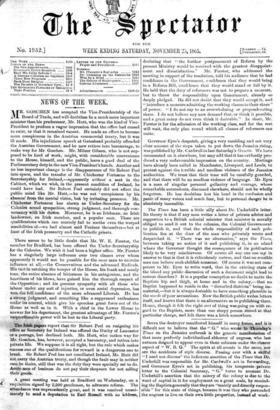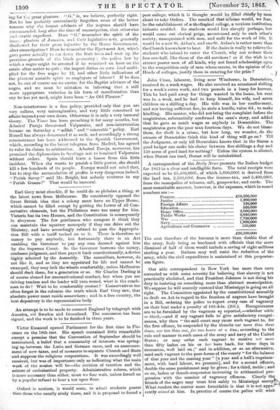Seeva the destroyer manifested himself in many forma, and it
is difficult not to believe that the " G." who wrote to Thursday's Times on the Jamaica outbreak is the generic manifestation of that more perfectly individualized abhorrer of negroes, who last autumn deigned to appear even in these columns under the clearer aspect of " W. R. G." The spirit at all events is the same, nor are the accidents of style diverse. Passing over with a skilful "I need not discuss" the ludicrous assertion of the Times that Dr. Underhill was responsible for Mr. Cardwell's act in forwarding, and Governor Eyre's act in publishing, his temperate private letter to the Colonial Secretary, " G." turns to account Dr. Underhill's assertion that the misery of the colony is due to the want of capital in it for employment on a great scale, by remind- ing the Baptists generally that they are "mainly and directly respon- sible" for this state of things, because it was they who persuaded the negroes to live on their own little properties, instead of work-
ing for tic great planters. "G." is, we believe, perfectly right. But he has probably conveniently forgotten some of the better reasons why the honest advisers of the negroes should have recommended, long after the time of emancipation, that otherwise and .4irable expedient. Does " G." remember the spirit of the insao planters of Jamaica, and their legislative acts, generally disallowed for their gross injustice by the Home Government, after emancipation ? Does he remember the Ejectment Act, which gave power actually to cut down the fruit trees and root up the provision-grounds of the black peasantry ; the police law by which a negro might be arrested if he remained an hour on the estate after notice to quit ; the import duties on corn food multi- plied for the free negro by 12, and other little indications of the planters' amiable spirit as employers of labour? If he does not, he can of course see no excuse for the Baptist advisers of the negro, and we must b3 mistaken in inferring that a still more appropriate variation in his form of manifestation than any he has yet used, might have been "An Old Planter."































